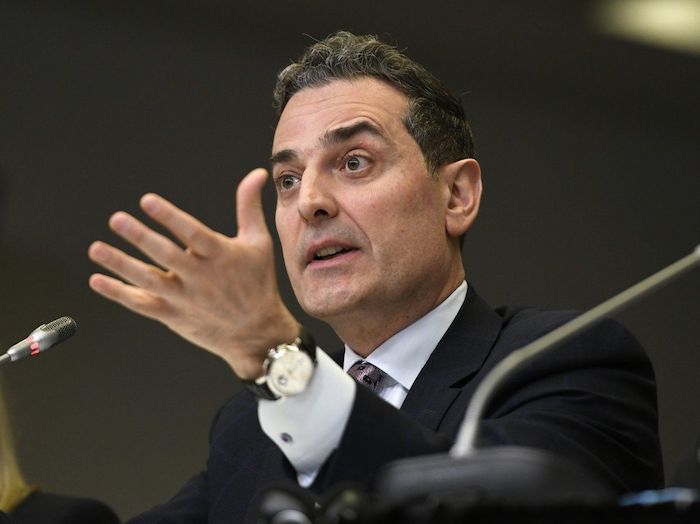Business
Bell CEO warns ‘interventionist’ regulations could lead telcos to curtail investments

Mirko Bibic, president and CEO of BCE and Bell Canada speaks during a CRTC hearing for Telecom Notice of Consultation CRTC 2019-57, Review of mobile wireless services, in Gatineau, Que., on Wednesday, Feb. 19, 2020. THE CANADIAN PRESS/Justin Tang
By Sammy Hudes in Toronto
Bell Canada president and CEO Mirko Bibic warned Monday that increased regulation in Canada’s telecommunications industry could prompt companies to scale back investment and make cuts to service for underserved communities.
Speaking at a lunch hosted by Canadian Club Toronto, Bibic took aim at the federal government and Canadian Radio-television and Telecommunications Commission for a shift “towards more micromanagement of Canada’s telecom industry.”
He said some investments are “impossible to justify” when big companies are required to provide smaller competitors access to their privately built networks at heavily discounted rates.
“Our industry is quite highly regulated and we appear to be moving rapidly towards even more intervention,” said Bibic, adding that such an approach “generates market uncertainty.”
“Our regulator’s telling us that we have to give access to the new networks that our people, our partners and our capital are building and they’re telling us the rates we have to charge for that access. That’s not how a competitive market should be regulated. [It] certainly doesn’t strengthen the quality or resiliency of the networks and services you all rely on.”
Earlier this year, Canada’s telecommunications regulator announced it would lower some wholesale internet rates by 10 per cent and review whether big companies should provide smaller competitors access to their fibre-to-the-home networks.
The CRTC said the move was aimed at improving internet speeds and bolstering competition.
That came after federal Industry Minister Francois-Philippe Champagne directed the regulator to implement new rules to enhance consumer rights, affordability, competition and universal access, which included a requirement for improved wholesale internet rates.
The CRTC also stated earlier this month that major telecoms would have 90 days to negotiate access agreements for mobile virtual network operators (MVNOs). That followed a policy set in 2021 allowing regional cellphone providers to compete as MVNOs across Canada using networks built by large companies.
But Bibic urged Ottawa and the CRTC to ensure Canada’s four major telecom companies have incentives to invest and differentiate themselves from each other, which he said would lead to more customer value. He warned of “unintended consequences” if regulation continues to ramp up.
“There comes a point where if government is too interventionist, all of us are going to have to scale back those investments, which is not good for consumers and businesses,” he said.
“If you’ve got to start cutting back on capital, what gets cut first? Does the GTA get cut first? Or does some northern community in Ontario get cut first? We know the answer to that.”
Bibic also pushed back against a “prevailing but false narrative” surrounding the state of competition in Canada’s telecom industry, as well as cellphone and internet prices.
A report released in February by Wall Communications Inc., which conducts an annual comparison of Canadian phone and internet prices to other jurisdictions, found Canada still had among the highest prices internationally for cellphone and broadband service in 2022.
But Bibic noted that despite rising inflation, wireless prices in Canada have declined eight per cent over the past two years and almost 25 per cent since January 2020.
“We’ve all been in the U.S. right? The service is terrible. So there is a quality dimension to it,” he told the crowd.
“Too often, the prevailing narrative is based on these studies that by definition create these average baskets of goods so that there’s some semblance of trying to compare prices across the world, but the baskets of goods don’t actually reflect what people are buying today.”
This report by The Canadian Press was first published May 29, 2023.
Companies in this story: (TSX:BCE)
Internet
US government gave $22 million to nonprofit teaching teens about sex toys: report

From LifeSiteNews
The Center for Innovative Public Health Research’s website suggests teenage girls make their ‘own decisions’ about sex and not let their parents know if they don’t want to.
For almost a decade, the U.S. government funded a group that actively works to teach kids how to use sex toys and then keep them hidden from their parents to the tune of $22 million.
According to investigative reporter Hannah Grossman at the Manhattan Institute, The Center for Innovative Public Health Research (CIPHR) has been educating minors about sex toys with public funds.
Records show that the millions given to the group since 2016, according to its website, go toward “health education programs” that “promote positive human development.”
However, the actual contents of the programs, as can be seen from comments from CIPHR CEO Michele Ybarra, seem to suggest that its idea of “human” development is skewed toward radical sex education doctrine.
In 2017, CIPHR launched Girl2Girl, which is funded by federal money to promote “sex-ed program just for teen girls who are into girls.” Its website lets users, who are girls between ages 14 and 16, sign up for “daily text messages … about things like sex with girls and boys.”
The actual content of some of the messages is very concerning. Its website notes that some of the texts talk about “lube and sex toys” as well as “the different types of sex and ways to increase pleasure.”
The website actively calls upon teenage girls to make their “own decisions” and not let their parents know if they don’t want to.
Grossman shared a video clip on X of Ybarra explaining how they educate minors about the use of “sex toys” and dealing with their parents if they are found out.
The clip, from a 2022 Brown University webinar, shows Ybarra telling researchers how to prepare “young person(s)” for her research.
She said if they are doing “focus groups,” she will ask them, “Okay, so what happens if somebody comes into the room and sees words like penis and sex toys on your screen — on your computer screen or on your phone? What if it’s your mom?’”
In 2023, CIPHR launched Transcendent Health, which is a sex-education program for minors who are gender confused. This initiative received $1.3 million of federal grant money that expired last month.
Grossman observed that the federal government “should not fund programs that send sexually explicit messages to minors and encourage them to conceal these communications from parents.”
She noted that in order to protect children and “prevent further harm,” U.S. President Donald Trump’s Department of Health and Human Services “should immediately cancel CIPHR’s active contract and deny its future grant applications.”
“By doing so, the Trump administration can send a clear message: Taxpayers will no longer foot the bill for perverted ‘research’ projects,” she noted.
The Trump administration has thus far, through the Department of Government Efficiency (DOGE), exposed billions in government waste and fraud. Many such uses of taxpayer dollars are currently under review by the administration, including pro-abortion and pro-censorship activity through USAID, “Diversity, Equity, and Inclusion and neo-Marxist class warfare propaganda” through the National Science Foundation, and billions to left-wing “green energy” nonprofits through the Environmental Protection Agency.
Business
Canadian Police Raid Sophisticated Vancouver Fentanyl Labs, But Insist Millions of Pills Not Destined for U.S.

 Sam Cooper
Sam Cooper
Mounties say labs outfitted with high-grade chemistry equipment and a trained chemist reveal transnational crime groups are advancing in technical sophistication and drug production capacity
Amid a growing trade war between Washington and Beijing, Canada—targeted alongside Mexico and China for special tariffs related to Chinese fentanyl supply chains—has dismantled a sophisticated network of fentanyl labs across British Columbia and arrested an academic lab chemist, the RCMP said Thursday.
At a press conference in Vancouver, senior investigators stood behind seized lab equipment and fentanyl supplies, telling reporters the operation had prevented millions of potentially lethal pills from reaching the streets.
“This interdiction has prevented several million potentially lethal doses of fentanyl from being produced and distributed across Canada,” said Cpl. Arash Seyed. But the presence of commercial-grade laboratory equipment at each of the sites—paired with the arrest of a suspect believed to have formal training in chemistry—signals an evolution in the capabilities of organized crime networks, with “progressively enhanced scientific and technical expertise among transnational organized crime groups involved in the production and distribution of illicit drugs,” Seyed added.
This investigation is ongoing, while the seized drugs, precursor chemicals, and other evidence continue to be processed, police said.
Recent Canadian data confirms the country has become an exporter of fentanyl, and experts identify British Columbia as the epicenter of clandestine labs supplied by Chinese precursors and linked to Mexican cartel distributors upstream.
In a statement that appears politically responsive to the evolving Trump trade threats, Assistant Commissioner David Teboul said, “There continues to be no evidence, in this case and others, that these labs are producing fentanyl for exportation into the United States.”
In late March, during coordinated raids across the suburban municipalities of Pitt Meadows, Mission, Aldergrove, Langley, and Richmond, investigators took down three clandestine fentanyl production sites.
The labs were described by the RCMP as “equipped with specialized chemical processing equipment often found in academic and professional research facilities.” Photos released by authorities show stainless steel reaction vessels, industrial filters, and what appear to be commercial-scale tablet presses and drying trays—pointing to mass production capabilities.
The takedown comes as Canada finds itself in the crosshairs of intensifying geopolitical tension.
Fentanyl remains the leading cause of drug-related deaths in Canada, with toxic supply chains increasingly linked to hybrid transnational networks involving Chinese chemical brokers and domestic Canadian producers.
RCMP said the sprawling B.C. lab probe was launched in the summer of 2023, with teams initiating an investigation into the importation of unregulated chemicals and commercial laboratory equipment that could be used for synthesizing illicit drugs including fentanyl, MDMA, and GHB.
The Bureau is a reader-supported publication.
To receive new posts and support my work, consider becoming a free or paid subscriber.
Invite your friends and earn rewards
-

 2025 Federal Election1 day ago
2025 Federal Election1 day agoRCMP memo warns of Chinese interference on Canadian university campuses to affect election
-

 2025 Federal Election2 days ago
2025 Federal Election2 days agoFifty Shades of Mark Carney
-

 2025 Federal Election20 hours ago
2025 Federal Election20 hours agoResearchers Link China’s Intelligence and Elite Influence Arms to B.C. Government, Liberal Party, and Trudeau-Appointed Senator
-

 2025 Federal Election2 days ago
2025 Federal Election2 days agoCommunist China helped boost Mark Carney’s image on social media, election watchdog reports
-

 MAiD2 days ago
MAiD2 days agoDisability rights panel calls out Canada, US states pushing euthanasia on sick patients
-

 Justice2 days ago
Justice2 days agoCanadian government sued for forcing women to share spaces with ‘transgender’ male prisoners
-

 Alberta2 days ago
Alberta2 days agoAlberta takes big step towards shorter wait times and higher quality health care
-

 Energy2 days ago
Energy2 days agoTrump signs four executive orders promoting coal industry










